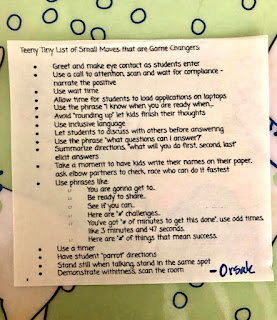This is a repost from last year... but too good not to share again.
Enjoy!
Fast Llama's
I am sharing this free resource from Doug Curry today. His writing is so good, I can just hear his voice. Doug Curry has tons of free resources that I am beginning to share with you, coupled with the OTFD session we had with Jenny, there is a lot of good things happening for our students at Labay!
Here is one of the free resources Doug wrote about the greatest gift teachers have; a Christmas Break RESET!
Enjoy!
Have you been such a slow llama this year that it has been months since you have even seen the pack?
Are you so slow that the pack conspires to avoid you?
Are you now doubting that the pack in fact even exists?
Has this year caused you to seriously question your career choice?
Do you have one wall of your classroom dedicated to marking off the days as if you are awaiting parole?
You are not alone! This is particularly true if you are new to this profession or new to your unique circumstance.
There are very few jobs in the world that allow for an opportunity to completely start over and thus correct all of the mistakes that one has made. The world of sports comes to mind. As long as a football player has not yet been run out of the league, each new year offers a chance for redemption. You see this all the time in sports. A player who last year basically stunk now turns into this year’s hottest superstar.
Fortunately for us, teaching is one of these professions that offers the opportunity for, shall we say, “rebirth.” Every year, unless you loop with the same kids (and thus bring along all of your mistakes in the same way that we carry viruses with us from room to room), you have a completely new opportunity to start over and correct all of your mistakes from the previous year.
Why are we talking about starting over when only half of the year is completing? Fair question.
However, never underestimate the power of the holiday break!
Granted, it is not summertime. We don’t have the opportunity for complete redemption.
If done right, your two weeks off along with the return of your students in January offers you the opportunity to hit a very important button:
That’s right! You can definitely hit the reset button.
When the kids come back in January, they can be met with the “new you!”
How do you make this happen? Here are the steps:
1. Be quick to forgive yourself for whatever mess you may have created during this first semester.
In any type of leadership position, which of course includes teaching, leaders inevitably make mistakes. Great leaders take responsibility for their mistakes, but they don’t dwell on them. They learn from their mistakes, adjust, and move on. Picture a great quarterback who throws an interception early in a game. Did he mean to throw it? Of course not. If he dwells on the mistake, he may become reluctant to do all of the things that come with being the leader of the team, which in this case means: Throw the ball! It takes real courage to continue to lead after you have made a mistake. Guess what? No matter how good you become at this job, you will still make mistakes.
2. While forgiving yourself for the mistakes you made the first semester, own them. They are yours. You did it. Your classroom will be whatever you want it or allow it to be. If it has been terrible, you did it.
When we fail, we will do everything we can to justify our failure. It’s human nature, but it’s a losing strategy.
You can try and convince yourself and others that everyone else in your school is failing at classroom management, but I’m sorry. It’s not true. Folks like me who get to visit all different classrooms can tell you. There are teachers on your campus who are succeeding. They are succeeding with the same students who seem to enjoy seeing you suffer.
It’s you.
Have courage and accept it. It’s the first step in overcoming any problem.
3. Make a list of all that has gone wrong related to your classroom management during this first semester. Here is a resource that will help: https://drive.google.com/open?id=1rgdxyqY6O-Xx_ShcUPW6Q0CJHNNhT89_
4. Now make a list of what you are going to do to make it better.
Does it involve your:
• Classroom Systems? https://drive.google.com/open? id=14MWj0f3dE08GUdXKOVc32a-7E9FHQlnN
• Teacher Presence? https://drive.google.com/open? id=1bFv52GUPY0nICrHpB_NV20LRntOECJK1
• Your Beliefs? https://www.youtube.com/watch?v=BnEpFoh9gnI
• Your Relationships with your Students?
5. Prioritize. You won’t be able to do everything.
Pick the most important things.
• Your room arrangement • How you have your materials stored.
• How students enter.
• How you dismiss.
• How you gain and keep their attention.
• How they respond in class.
Your classroom will be whatever you want it to be.
If it is great, it is because of you.
If it is terrible, you allowed it.
Kids will rise to whatever level you expect.
They will also sink as low as you let them go.
The new year is a gift! Take advantage of this opportunity!
Thank you for what you do! - Doug
Have a wonderful break! We have just 10 days to make a difference to the life of a kid. Make them miss us! Make them look forward to coming back in January! Make them and each other believe there is no better place to be than to be together at school!
-Tracy












